Rating: Transsupportive, Daily Mail, July 27, 2023 (PDF archive) (HTML archive)
Content Summary
Transgender player Quinn shaking up the Women’s World Cup: Non-binary Canada midfielder no longer identifies as a woman
Transgender player Quinn shaking up the Women’s World Cup: Non-binary Canada midfielder no longer identifies as a woman – and loyal team mates insist they ‘don’t deserve such a good person’ on their side
By Lydia Hawken For Mailonline
The Canada vs Nigeria game might have ended in a goalless draw at the Women’s World Cup last week – but that doesn’t mean it won’t go down in history.
Canadian star Quinn, 27, became the first non-binary, transgender player to ever compete in the FIFA World Cup when they took to the field.
Although it didn’t shape up to be the most exciting match, Quinn’s appearance was a significant win for transgender rights in the sporting world at a time when sporting bodies are implementing stricter rules around trans inclusion.
In Summer 2020, Quinn – who uses they/them pronouns – was part of the team who had won Gold in the national Women’s Football team at the Tokyo Olympics.
Following this, the sporting star – whose first name used to be Rebecca – came out as non-binary and requested to be known by their surname going forward.
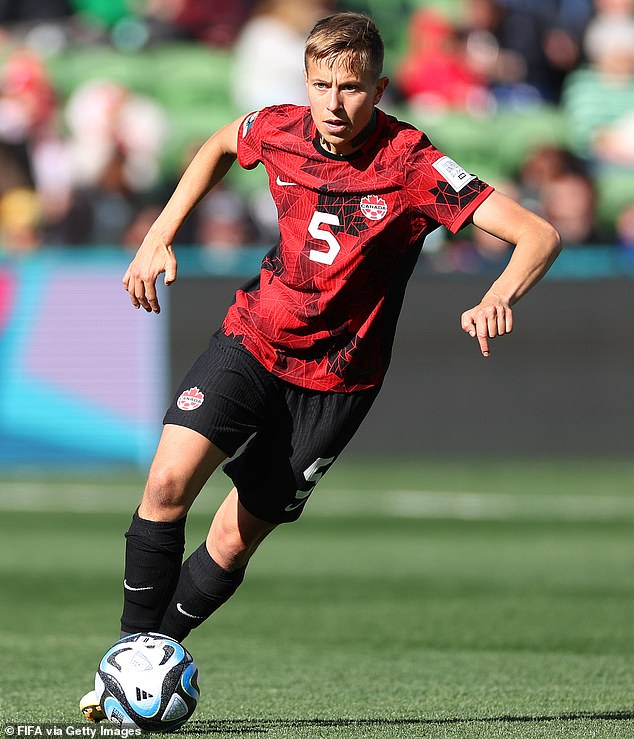
Here FEMAIL takes a look back at Quinn’s early life and career and how they’ve become a figurehead for trans rights in women’s football.
Early Talent for Football
Quinn was born in Toronto, Canada, on August 11 1995, to parents Bill and Linda Quinn – who had four children.
As their parents were keen rugby and basketball plans, sport was a big part of Quinn’s upbringing and they began playing football from the age of six.
Quinn is said to have asked their parents to set them with football lessons after watching their older sister playing. Alongside this, they also played hockey, swam and took part in skiing competitions.
Speaking to Toronto.com in 2013, Quinn said: ‘My parents put me in dance classes: ballet, jazz, hip-hop – and I hated it. But I always had a fondness for soccer. That was number one.’
But while sports gave Quinn huge joy, they were struggling with their gender identity behind the scenes.
Speaking to The Torono Star in 2020, Quinn recalled: ‘People have feelings, those aren’t new.
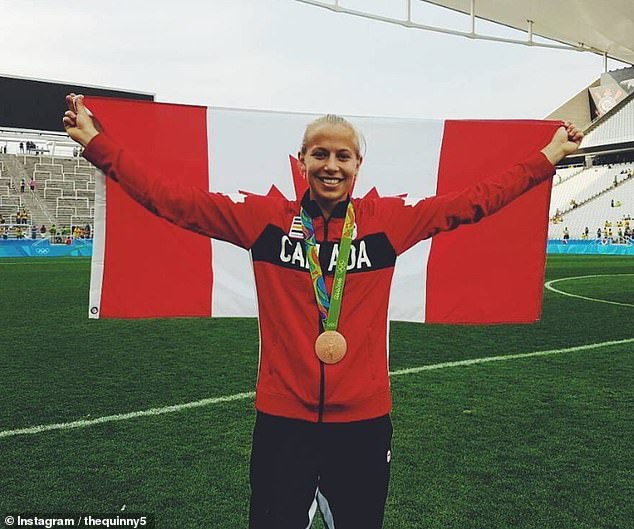
‘I think I can identify a lot of feelings I had as a child but I couldn’t verbalize them, I couldn’t understand what space I fit into.’
Struggling with gender identity
Quinn also told the publication that the private girls’ school they attended attempted to bring discussions of gender identity and sexuality into classrooms.
However, they said it took meeting other people within their community to understand the true extent of how they were feeling.
From 2013 to 2018, Quinn was enrolled at Duke University in Durham, North Carolina – where they studied biology.
During this time, they were part of the Duke Blue Devils team – where they played as a defender and midfielder.
In 2017, they were awarded the Atlantic Coast Conference Midfielder of the Year award.
What’s more, they also Quinn also represented Canada at the 2016 Rio Olympics when they were still at university – winning bronze for their national team.
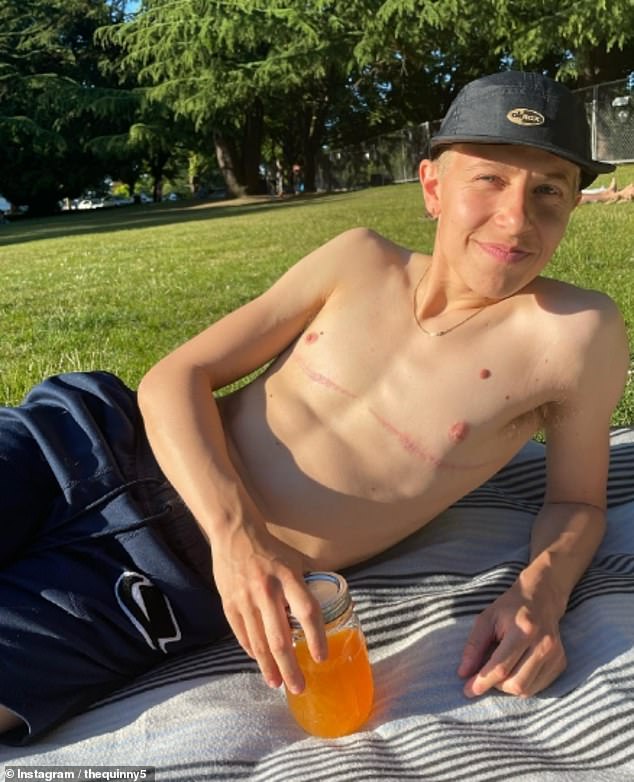
At university, Quinn also took women and gender studies classes to try and come to terms with how they were feeling.
They added: ‘I’m not saying that it was completely linear for me; I think every day I was still exploring how I express myself in terms of how I perform gender but I think language is so significant and being able to pinpoint it can bring so much comfort to people and to entire communities.’
They previously told the BBC: ‘We live in a world that is so binary and I have been receiving messages ever since I was a young child about how I should act, how I should portray myself and how I should be and anything that deviated from that was essentially wrong.’
Although Quinn has been honest with their loved ones about being non-binary and transgender for years, they admitted that the language has proven difficult for their parents to grasp.
‘It actually isn’t as daunting as it may seem,’ Quinn added. ‘It just takes a little bit of practice.’
Coming out as transgender
In September 2020, Quinn came out as non-binary and transgender in a heartfelt Instagram post shared with their 64,000 followers.
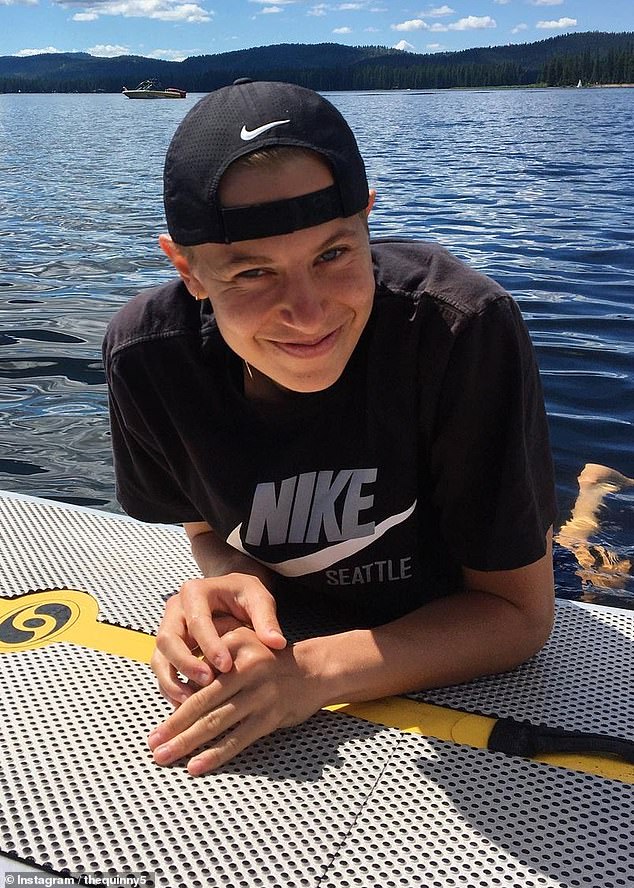
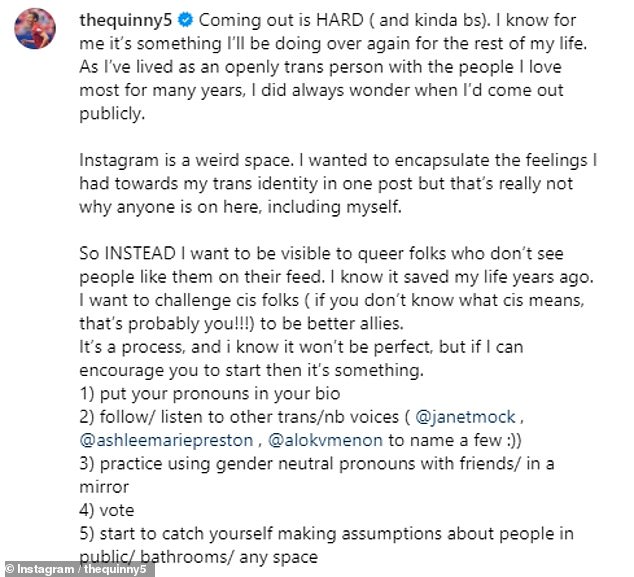
They wrote at the time: ‘Coming out is HARD ( and kinda bs). I know for me it’s something I’ll be doing over again for the rest of my life. As I’ve lived as an openly trans person with the people I love most for many years, I did always wonder when I’d come out publicly.
‘Instagram is a weird space. I wanted to encapsulate the feelings I had towards my trans identity in one post but that’s really not why anyone is on here, including myself.
‘So INSTEAD I want to be visible to queer folks who don’t see people like them on their feed. I know it saved my life years ago. I want to challenge cis folks ( if you don’t know what cis means, that’s probably you!!!) to be better allies.
‘It’s a process, and I know it won’t be perfect, but if I can encourage you to start then it’s something.’
Quinn ended the post by urging their followers to also put their pronouns in their social media bios, following other transgender and non-binary figures, practicsing gender neutral pronouns and ‘catching yourself making assumptions about people in bathrooms’.
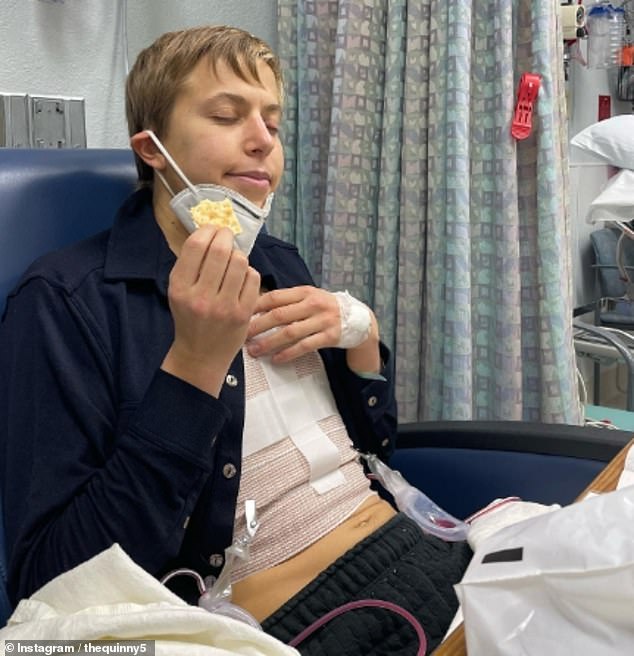
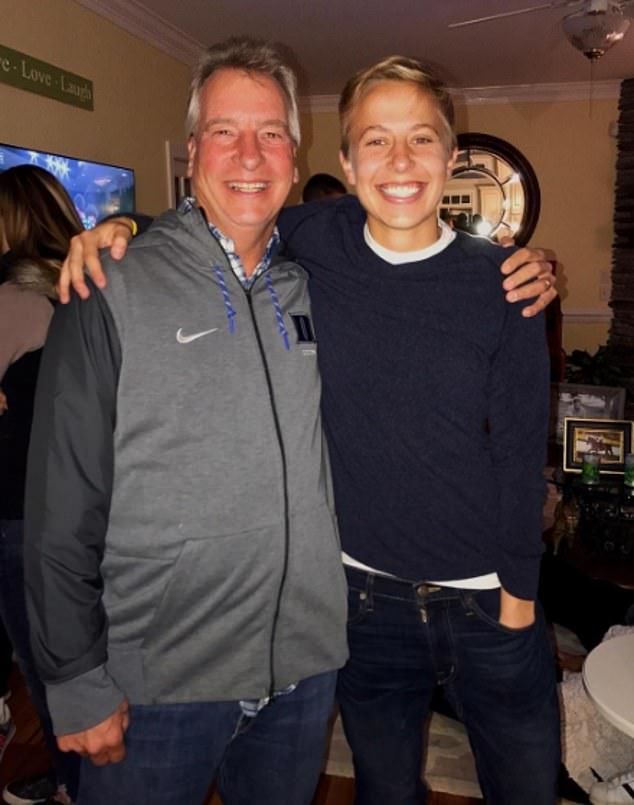
At the time, Quinn was on loan at the Swedish team Vittsjö GIK. Just two months later, Quinn shared a heartfelt post to mark the one-year anniversary of their top surgery, which removed breast tissue.
Posting a photo of them recovering in hospital, the player wrote: ‘I was so worried to get top surgery before the Olympics. Would it impact my preparations? What would my staff and teammates think?
‘Turns out, it was the best thing I could have done. Everyone’s journey is different and for me, following the path of affirming surgery has given me comfortability, confidence and relief.
‘Affirmative care should be a right. Currently, care is inaccessible to so many due to costs, discriminatory medical professionals, and government restrictions.’
Although Quinn has had top surgery, they said shortly after coming out that they are not taking testosterone – a hormone which may have given them an advantage over female players.
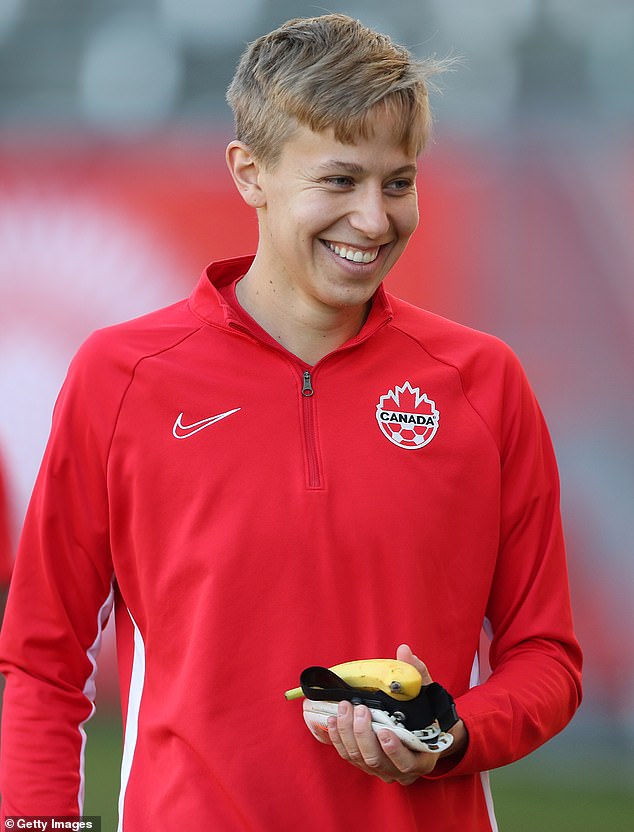
Speaking to NewsChain in 2020, Quinn said they ‘do not plan to increase their testosterone levels nor medically transition through other methods while playing professionally.’
Currently, FIFA makes a decision on a transgender player’s ability to compete on an individual case basis.
After they came out, Quinn discussed how ‘gendered’ football is with their local paper.
They said: ‘I think that, for me, [soccer] has been so great to have in this process, but as well it is such a gendered space … and I don’t think it’s completely necessary.’
They continued: ‘We have such rigidity in terms of our gender and we’re excluding trans women, we’re excluding cis women, like in terms of Caster Semenya, because they don’t fulfil this white, colonial idea of what it is to be a woman.
‘When we get back to why we’re all here and why we’re all playing sports, it’s to celebrate physical excellence.’
What’s more, the player also paid tribute Harrison Browne – who was the first transgender professional hockey player.
Describing how their story ‘saved Quinn’s life’, they wrote on Instagram: ‘Just in general, I was having a really difficult time doing day-to-day things, going to the washroom, whatever else.
‘You’re ridiculed and humiliated on a consistent basis, unfortunately, and so I think for me … they really did give me hope during that difficult time in my life. I wanted to be able to give that to other people who were confused … their own hope for the future.’
Facing backlash
However, not everyone is enthusiastic about Quinn’s historic moment at the World Cup – including Piers Morgan, who is famous for his verbal battles with trans activists.

On Wednesday, the outspoken broadcaster said Quinn shouldn’t be allowed to play in the tournament because they don’t identify as a woman.
‘How can you be transgender and non binary?’ asked the panel on his Uncensored talk show. You both know this is such crap.’
Morgan went on to say: ‘She’s a biological woman playing against other biological women. If she doesn’t identify as a woman, why is she playing in the FIFA Women’s World Cup?
‘They don’t qualify for the Women’s World Cup because they used to be a woman. Now they don’t want to be a woman so now we have to call them they for being a transgender even though they are non-binary and they’re playing in the Women’s World Cup and we’re all supposed to go, ‘Well done Quinn. What a moment’.’
Since transitioning in 2020 Quinn has been allowed to continue playing professional women’s soccer on the basis of their sex assigned at birth, and has no plans to increase their testosterone levels while competing.
Campaigning for trans rights in sport
Earlier in the year, Quinn had participated in Playing for Pride – and called out the ‘policing of trans bodies’ in the sports world in a promotional video for the LGBTQ+ campaign.
In June 2021, Quinn publicly thanked their peers for their support after they came out as transgender.
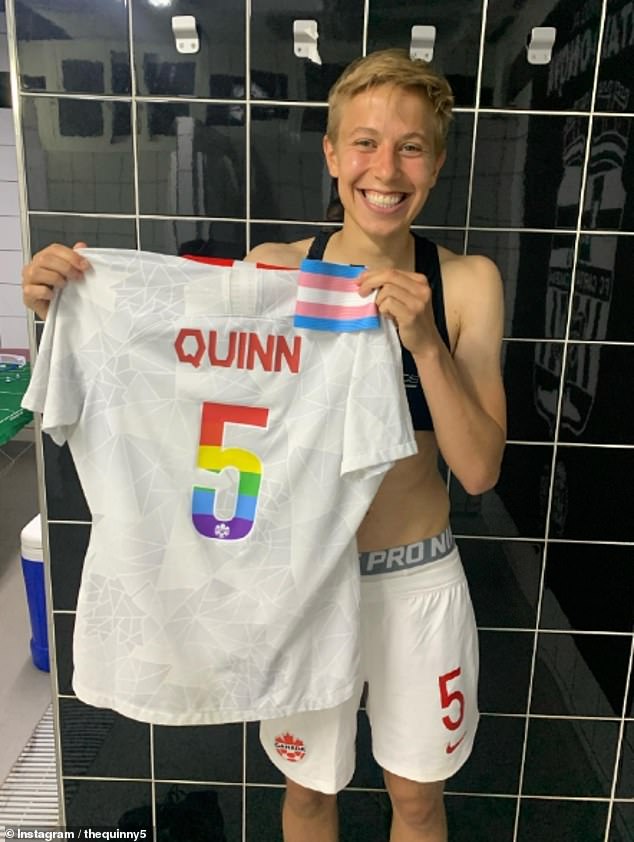
Sharing a photo of their Pride-themed football shirt, they wrote: ‘This team is hard to put into words!
‘They have embraced change and leaned into uncomfortable conversations and I love them for it. Taking home this armband because I never thought I’d see this day!!’
Quinn’s announcement made headlines all across the world with FIFA commenting on the news in a statement.
The world governing body said at the time: ‘FIFA congratulates Rebecca Quinn for being out and proud, and we wish them continued success in their career and for the future.’
Meanwhile, Canada coach Bev Priestman couldn’t be more glowing in her praise of the 27-year-old.
She recently said: ‘I’m really proud of what Quinn’s doing to raise awareness and make, I guess, this world a much more inclusive place.
‘When you talk about why (to) do these things, it is a bigger purpose. I think that’s really important.’
Meanwhile, Quinn’s Canadian team-mates are fully-behind their trailblazing efforts to normalise trans and non-binary people across football and society.
Christine Sinclair – captain of the national team – said: ‘We joke that we don’t deserve Quinn. They’re that good of a person.’

Speaking to the Toronto Star ahead of Fifa World Cup, Quinn emphasised how important this is given what is going on in the US in regards to trans and non-binary people.
‘I think it is a scary time, for me,’ they said. ‘I think I do have a lot of points of privilege when entering this conversation, so I have to be mindful of that. But I think the reality is, it’s scary.
‘I’m someone who’s gone through parts of medical transition, and I think trying to navigate the United States right now, which is where I live, it’s a difficult one, for sure, in day-to-day life.
‘I’m lucky enough to be in an environment in Seattle that’s pretty liberal and accepting and easy to operate in, but I don’t think that’s the case for all of the US right now.
But for now, Quinn will be hoping to help Canada build on their Olympic Gold medal by surpassing their best-ever finish at a World Cup – the quarter-finals in 2015 – starting with a clash against the Republic of Ireland on Wednesday.
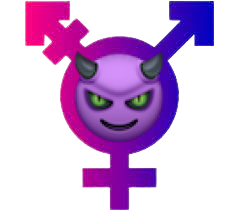
Leave a Reply